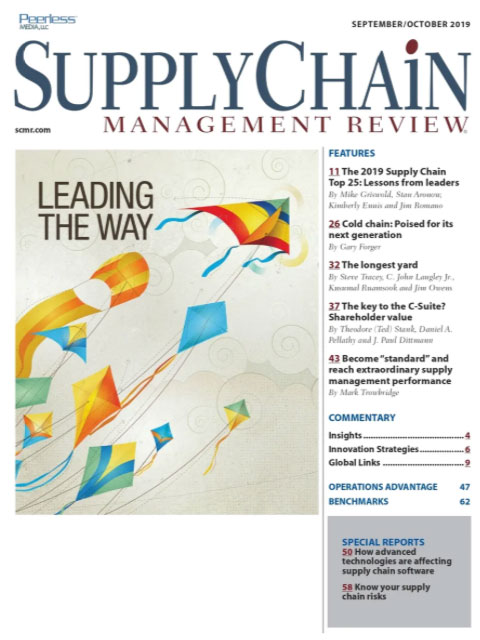Sorry, but your login has failed. Please recheck your login information and resubmit. If your subscription has expired, renew here.
September-October 2019
It’s that time of year again, when we feature the Top 25 supply chains from Gartner. What I enjoy most about this research is the window it provides into where supply chains are going next: After all, while some lead, the rest of us follow. Browse this issue archive.Need Help? Contact customer service 847-559-7581 More options
My last Insights column, “Advocating for ‘responsible’ supply chains,”* was written because I noted that in today’s seemingly toxic, contentious and uncivil culture, people seem to be confusing being ethical with being responsible. However, they are two different concepts, in my view.
Ethical is defined as “pertaining to or dealing with morals or the principles of morality; pertaining to right and wrong in conduct.” Responsible, meanwhile, means “answerable or accountable, as for something within one’s power, control or management.” I believe the latter is more appropriate for business decisions, because the law dictates those business activities that are legal (think good) versus illegal (think bad).
I first used the term responsible in an Insights article where I postulated that companies over-outsourced over the past several decades.** At the time, I pointed to a variety of factors that might have incentivized companies to do so. However, I also felt that too many outsourcing decisions were not considering an important factor: Justice. That is, justice dictates that companies have a national debt to pay to their country of origin.
Because I never really appreciated the one philosophy course I took in college, several years ago I watched a PBS series, “Justice: What’s the Right Thing to Do;” based on a course given to undergrads at Harvard University by Professor Michael Sandel.

This complete article is available to subscribers only.
Log in now for full access or start your PLUS+ subscription for instant access.
SC
MR
Sorry, but your login has failed. Please recheck your login information and resubmit. If your subscription has expired, renew here.
September-October 2019
It’s that time of year again, when we feature the Top 25 supply chains from Gartner. What I enjoy most about this research is the window it provides into where supply chains are going next: After all, while some… Browse this issue archive. Access your online digital edition. Download a PDF file of the September-October 2019 issue.My last Insights column, “Advocating for ‘responsible' supply chains,”* was written because I noted that in today's seemingly toxic, contentious and uncivil culture, people seem to be confusing being ethical with being responsible. However, they are two different concepts, in my view.
Ethical is defined as “pertaining to or dealing with morals or the principles of morality; pertaining to right and wrong in conduct.” Responsible, meanwhile, means “answerable or accountable, as for something within one's power, control or management.” I believe the latter is more appropriate for business decisions, because the law dictates those business activities that are legal (think good) versus illegal (think bad).
I first used the term responsible in an Insights article where I postulated that companies over-outsourced over the past several decades.** At the time, I pointed to a variety of factors that might have incentivized companies to do so. However, I also felt that too many outsourcing decisions were not considering an important factor: Justice. That is, justice dictates that companies have a national debt to pay to their country of origin.
Because I never really appreciated the one philosophy course I took in college, several years ago I watched a PBS series, “Justice: What's the Right Thing to Do;” based on a course given to undergrads at Harvard University by Professor Michael Sandel.
 SUBSCRIBERS: Click here to download PDF of the full article.
SUBSCRIBERS: Click here to download PDF of the full article.
SC
MR


Latest Supply Chain News
Latest Podcast

 Explore
Explore
Business Management News
- 2024 Warehouse/DC Operations Survey: Technology adoption on the rise
- Benchmarking the complexity of ESG reporting
- Looking back at NextGen 2024
- The Corporate Sustainability Due Diligence Directive
- How to make your CFO a supply chain superfan
- Manufacturing again contracts in October, reports ISM
- More Business Management
Latest Business Management Resources

Subscribe

Supply Chain Management Review delivers the best industry content.

Editors’ Picks





